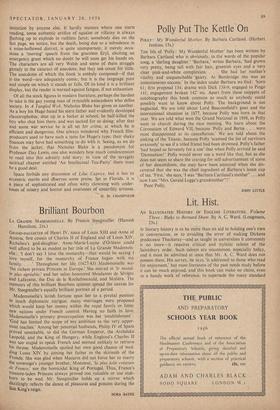Brilliant Bourbon
GRAND-DAUGHTER Of Henri IV, niece of Louis XIII and Anne of Austria, first cousin of Charles H of England and of Louis XIV, Richelieu's god-daughter, Anne-Marie-Louise d'Orleans could well afford to be as modest as her title of La Grande Mademois. elle:, 'I don't say I love the monarchy—that would be saying I love myself, for the monarchy of France began with my family. . . .' Throughout her life (1627-93) Mademoiselle was the richest private Princess in Europe.' She moved in 'le month le plus agreable,' and her salon honoured Mesdames de Sevigne and Lafayette, the Duc de la Rochefoucauld, and Moliere. The memoirs of this brilliant Bourbon spinster spread the canvas foi Mr. Steegthuller's equally brilliant portrait of a period.
Mademoiselle's lavish fortune spun her to a pivotal position in much diplomatic intrigue; many marriages were proposed which would keep her money within the royal family or fetter new nations under French control. Having no faith in love, Mademoiselle's primary preoccupation was her 'establishment': 'God has limited the scope of my ambition to the very upper- most reaches.' Among her potential husbands, Philip IV of Spain proved unsuitable, so did the German Emperor, the Archduke Leopold, and the King of Hungary, while England's Charles II was too'stupid to speak French and seemed unlikely to retrieve his throne. Mademoiselle spoiled her own good chance of wed- ding Louis XIV by joining her father in the skirmish of the Fronde. She was glad when Mazarin did not force her to marry the sovereign's younger brother, Monsieur, 'la plus jolie creature 'le France,' nor the homicidal King of Portugal. Thus, France's treasure-laden Princess always proved too valuable or too stub- born to be wed. Mr. Steegmuller holds up a mirror which dazzlingly reflects the dance of pleasures and poisons during the Sun King's reign.
NORA SAYRE


































 Previous page
Previous page